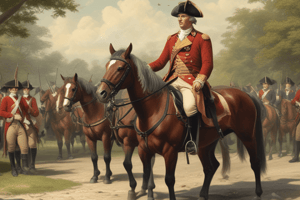Podcast
Questions and Answers
What was the most common form of taxation during the colonial era?
What was the most common form of taxation during the colonial era?
tariffs, duties, and taxes on commerce
The Stamp Act was a?
The Stamp Act was a?
tax on commerce
Which of the following statements about the income tax is most accurate?
Which of the following statements about the income tax is most accurate?
Although the income tax is currently one of the most important sources of government revenue, it had not yet developed during British rule over the colonies in the eighteenth century
Colonial protesters of the Stamp Act and the Sugar Act rallied around which slogan?
Colonial protesters of the Stamp Act and the Sugar Act rallied around which slogan?
Which of the following statements best describes British rule of the American colonies during the first half of the eighteenth century?
Which of the following statements best describes British rule of the American colonies during the first half of the eighteenth century?
The events that led to the Revolutionary War were triggered by which of the following?
The events that led to the Revolutionary War were triggered by which of the following?
A ________ is a system of government in which member states retain almost all of their sovereign authority and delegate limited powers to a weak central body.
A ________ is a system of government in which member states retain almost all of their sovereign authority and delegate limited powers to a weak central body.
The United States' first written constitution was called the ________.
The United States' first written constitution was called the ________.
According to the preamble of the U.S. Constitution, one of the purposes of government is to?
According to the preamble of the U.S. Constitution, one of the purposes of government is to?
Which of the following sectional interests was considered unimportant in the politics of the colonial period?
Which of the following sectional interests was considered unimportant in the politics of the colonial period?
The Boston Massacre occurred when?
The Boston Massacre occurred when?
Who defended the British soldiers involved in the Boston Massacre?
Who defended the British soldiers involved in the Boston Massacre?
The Boston Tea Party was largely a response to the?
The Boston Tea Party was largely a response to the?
Who orchestrated the Boston Tea Party?
Who orchestrated the Boston Tea Party?
The First Continental Congress was?
The First Continental Congress was?
Under the Articles of Confederation, the?
Under the Articles of Confederation, the?
How was political power in the Continental Congress divided under the Articles of Confederation?
How was political power in the Continental Congress divided under the Articles of Confederation?
The Articles of Confederation were ratified in ________.
The Articles of Confederation were ratified in ________.
Which of the following statements about national defense under the Articles of Confederation is FALSE?
Which of the following statements about national defense under the Articles of Confederation is FALSE?
Under the Articles of Confederation, it was left to the ________ to execute laws passed by the Continental Congress.
Under the Articles of Confederation, it was left to the ________ to execute laws passed by the Continental Congress.
Flashcards are hidden until you start studying
Study Notes
Taxation in Colonial Era
- Common taxation methods included tariffs, duties, and taxes on commerce.
- The Stamp Act established a tax on printed materials and commerce.
- Income tax was not established during British rule; it became significant later for government revenue.
Colonial Sentiment and Governance
- Protesters against the Stamp Act and Sugar Act used the slogan "no taxation without representation."
- British governance in the early 18th century was characterized by a light touch, influencing mainly larger cities.
- Events leading to the Revolutionary War were sparked by increased tax rates imposed by Britain.
Government Systems and Documents
- A confederation describes a governance system where member states retain sovereign authority, delegating limited powers to a weak central entity.
- The Articles of Confederation served as the United States' first written constitution, ratified in 1781.
Role and Purpose of Government
- According to the U.S. Constitution's preamble, one purpose of government is to promote justice and secure "blessings of liberty."
- Sectional interests during the colonial period largely overlooked the impact of slavery in politics.
Key Events Leading to the Revolution
- The Boston Massacre involved the killing of five colonists by British soldiers, highlighting tensions between colonists and British authorities.
- John Adams took the controversial step of defending the British soldiers involved in the Boston Massacre.
- The Boston Tea Party was a direct reaction to the British government's monopoly grant to the East India Company on tea export.
- Samuel Adams was the orchestrator of the Boston Tea Party.
Continental Congress and Its Authority
- The First Continental Congress gathered in 1774, advocating for a total boycott of British goods.
- Under the Articles of Confederation, the Continental Congress lacked the power to levy taxes, relying instead on states to enact laws.
- Political power within the Continental Congress was equitably distributed, with each state granted one vote.
National Defense and Governance Issues
- A false statement regarding national defense under the Articles of Confederation indicates that the president served as commander in chief of the armed forces, which was not the case.
- Enforcement of laws passed by the Continental Congress was the responsibility of individual states under the Articles of Confederation.
Studying That Suits You
Use AI to generate personalized quizzes and flashcards to suit your learning preferences.




